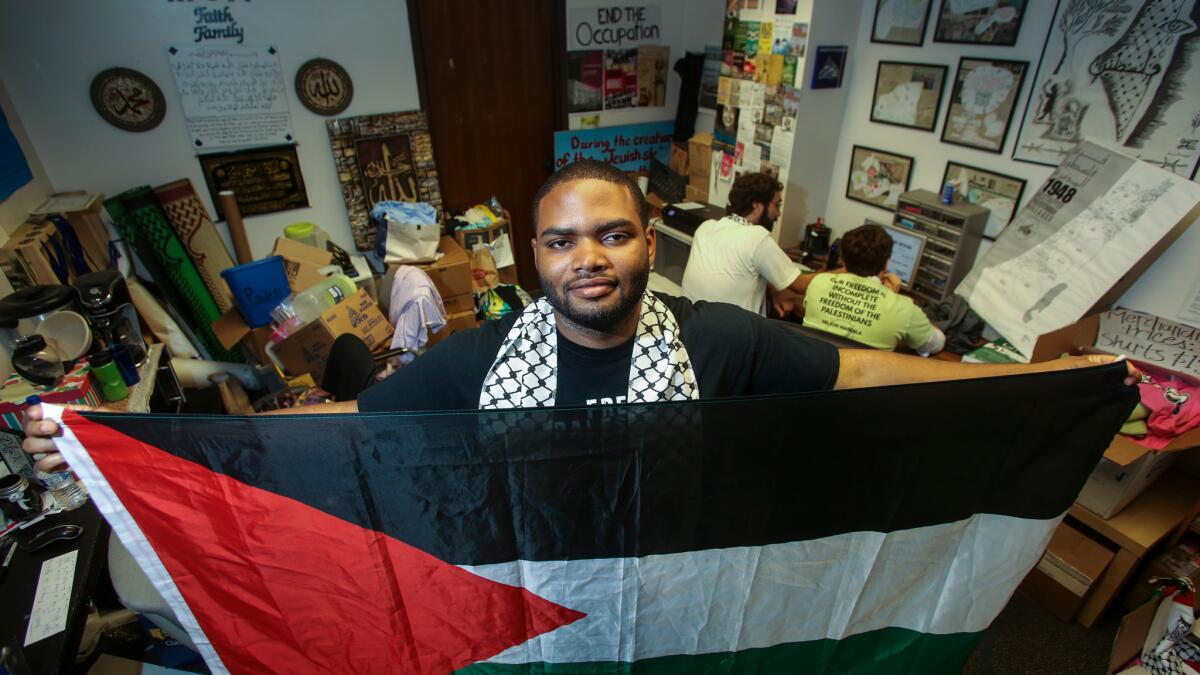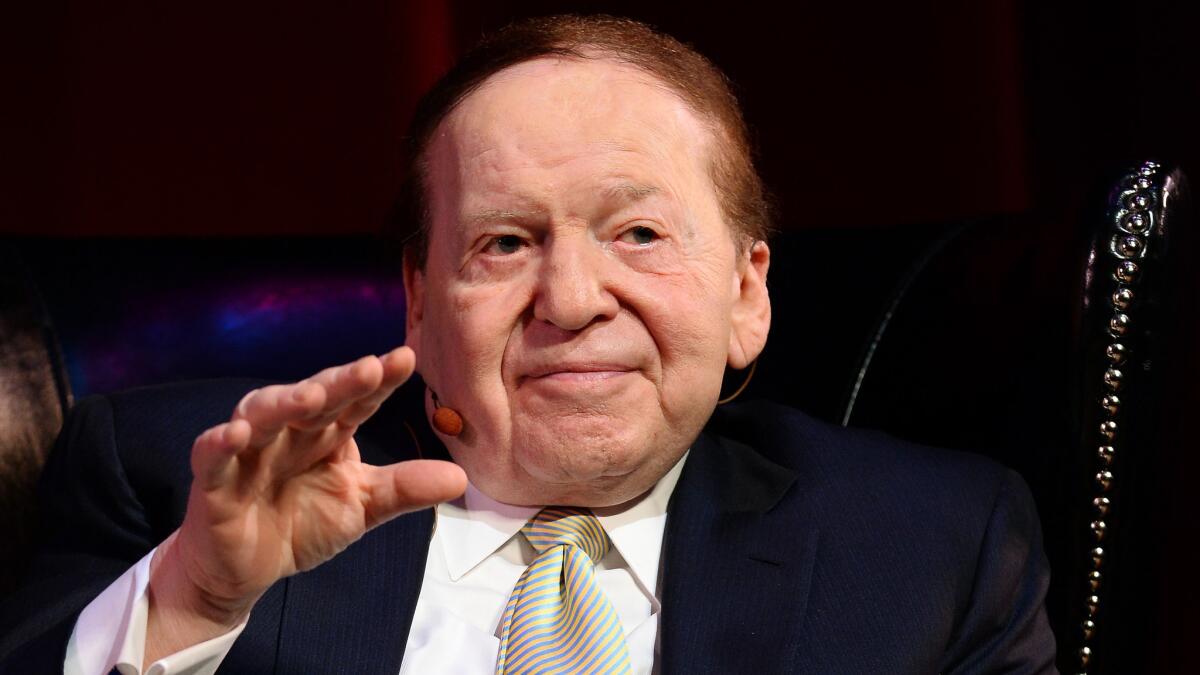How a casino tycoon is trying to combat an exploding pro-Palestinian movement on campuses

- Share via
Robert Gardner rarely heard anything about Israel growing up in South Los Angeles. But at UCLA, he started learning about the Israeli-Palestinian conflict — and seeing parallels with conflicts close to home.
The African American senior likened Israeli crackdowns on Palestinian protesters to police violence against black Americans. So he joined Students for Justice in Palestine and an international movement known as BDS, which advocates boycotts, divestment and sanctions against companies deemed players in Israeli human rights violations.
Earlier this year, though, he was shocked to see — on a poster outside a Westwood market — his name listed as one of 16 UCLA “Jew haters” and terrorist allies.
Since then, he says, “I’ve received death threats online, and people have followed me.”
The poster was part of a multimillion-dollar effort to combat the BDS movement, led by Las Vegas casino tycoon Sheldon Adelson and his wife, Miriam. While this kind of attack campaign is one tactic, a key aim is to win back hearts and minds for Israel via social media pushes, cultural fairs and subsidized trips to the Jewish state.
Our goal is to change the younger generation from neutral, if not opposed to, Israel to support of Israel.
— David Brog, executive director of the Maccabee Task Force
The effort kicked off this last semester at six California campuses, including UCLA, UC Irvine and San Jose State University, and will expand to 20 more college campuses this fall.
The Adelsons and other supporters of Israel are alarmed by the precipitous growth in young Americans’ support for Palestinians. A Pew Research Center poll in May found that 27% of millennials now sympathize more with Palestinians, up from 9% in 2006 — while their generation’s support for Israel has declined in the same period from 51% to 43%.
A main cause, Israel supporters say, is the mushrooming BDS campus movement. In the last four years, student governments at eight of nine UC undergraduate campuses have voted to support the campaign.
“It’s the No. 1 nonmilitary threat to Israel and the Jewish people,” David Brog, executive director of the new Adelson-funded task force, said of BDS. “Our goal is to change the younger generation from neutral, if not opposed to, Israel to support of Israel.”
The Maccabee Task Force — named after a small Jewish rebel group who prevailed over the Greeks two millennia ago — mainly aims to beef up positive education about Israel with such methods as hosting “peace tents” for dialogue during anti-Israel campus events and Israel cultural fairs — complete with free falafel and iced coffee.
But Brog said the campaign also will target what he called “lies” about Israel perpetuated by Students for Justice in Palestine and BDS.

Pro-Palestinian protests on campus regularly compare Israel’s treatment of Palestinians with South Africa under apartheid and oppression against people of color — and activists are using such comparisons to broaden their base, forging links with other campus movements.
The posters were one element of “Stop the Jew Hatred on Campus,” a task force-funded campaign launched in February by the David Horowitz Freedom Center in Los Angeles. Horowitz declined to disclose the size of the grant he received but said it helped him wage what he called a “guerrilla” campaign this spring, with posters of “Jew haters” on five California campuses.
The posters were condemned by some Jewish student groups, including J Street U and Jewish Voice for Peace. Jerry Kang, UCLA’s vice chancellor for equity, diversity and inclusion, criticized them as “thuggish intimidation” and accused the effort of promoting “guilt by association, of using blacklists, of ethnic slander and sensationalized images engineered to trigger racially tinged fear.”
Gardner called the poster’s accusations false, saying he does not support terrorists or hate Jews. His group, he said, explicitly condemns unlawful violence by anyone.
But the 25-year-old says that he’s “worried about people coming to campus to attack me.”
Horowitz, however, defends what he’s done and said he is planning more posters, speaking engagements and actions at 17 campuses, including six in California, this fall. “What the Maccabees are doing is an important service not just to Jews but to all Americans,” he said. “It’s the one hope we have. I wish there were more.”
NEWSLETTER: Get the day’s top headlines from Times Editor Davan Maharaj »
The Maccabee Task Force has not disclosed how much cash it plans to disburse. But Brog said initial reports of a $50-million investment were inaccurate. This year, he said, the task force has spent less than $10 million on pilot projects mostly aimed at making a “proactive case for Israel.”
One organization that accepted such money was Hillel at UCLA, though Rabbi Aaron Lerner said the Maccabee grant was a “tiny fraction” of Hillel’s $2-million annual budget.
The grant, Lerner said, helped Hillel send 40 students — most of them non-Jews — to Israel. They were able to meet activists from both sides trying to work together, learn about Israel’s past peace overtures and experience the country’s vibrant diversity, Lerner said.
“The facts on the ground are very different from apartheid and genocide,” said the rabbi, “but you can get away with lying if people are not educated.”
Hillel also used some of the money to stage a more elaborate annual Israel Fest — complete with a DJ and free food — and expand its programs during Israel Independence Week in May. The organization, which aims to enrich the lives of Jewish students, hosted a campus dinner to promote U.S.-Israel ties.
Such activities will change campus conversations about Israel from “black and white … to one about complexity, nuance and dialogue, which is better suited to a university,” Lerner said.
They also are in keeping with the new Principles Against Intolerance, which were passed by the University of California Board of Regents in March. The policy urges university leaders to combat anti-Semitism and other bias primarily with “more speech” to preserve 1st Amendment freedoms.
And more speech — or perhaps a war of words — is exactly what both sides plan.
Gardner said new support for the Palestinian cause by 50 African American organizations known as the Movement for Black Lives has galvanized students of color and their allies. The network recently unveiled a platform that mostly addresses domestic criminal justice, economic and political issues but also supports the BDS movement, calling Israel an “apartheid state” committing genocide against Palestinians.
That language provoked scathing criticism from the Anti-Defamation League and others.
But supporters of Israel acknowledge the significant challenge posed by growing alliances between communities of color and pro-Palestinian groups.
“It’s very worrisome, and Jewish students then get shut out of dialogues about social justice,” said Lisa Armony, who directs Hillel programming at UC Irvine. “We are looking at that situation very carefully to create greater understanding.”
Brog says the Maccabees are just warming up in their fight to turn the campus tide toward Israel. In the spring, they took South African students to Israel, then to San Jose State University to speak to Black Student Union members about what they had seen on their trip. The message: Israel is not an apartheid state as South Africa once was.
“We will invest, we will maintain our presence and we will have the persistence to defeat it,” he said of the BDS movement.
Miguel Olvera, a UC Irvine student of Mexican descent, said his evangelical Christian upbringing instilled reverence for Israel as “God’s country,” and his conversion from “unquestioned loyalty to Israel” to support for Palestinians came slowly. Friends in an Arabic class, a course on Third World cinema and his own research eventually swayed him to regard Zionism as an oppressive ideology rather than a liberation movement.
Olvera also began making connections with his own heritage. Israel’s West Bank separation barrier seemed to him akin to Donald Trump’s vision of a wall on the U.S. border with Mexico. Palestinians, he said, seemed to be stereotyped as terrorists just as Mexican immigrants often are cast as criminals who take jobs from Americans.
“I was almost scared about talking bad about Israel because I thought I’d be struck by lightning,” said Olvera, 21, who is studying comparative literature and Spanish. “But the [West Bank] wall was a very strong visual representation of the occupation, one I could connect to as a child of immigrants.”
His Chicano student group works with Students for Justice in Palestine. In May, they co-sponsored a controversial protest against a documentary about Israeli soldiers.
Gardner, a political science and urban planning major, said his interest in the Middle East was first piqued by the 2014 Israel-Gaza conflict. He began researching and concluded that both Palestinians and African Americans suffered from “racialized state violence” and “mass incarceration.” Segregated housing in Israel, he said, reminded him of Jim Crow laws.
Despite his initial fears about the poster, Gardner plans to keep protesting.
“At the end of the day, he said, “I feel passionate that I’m on the right side of history, and I’m fighting for justice and equality.”
ALSO
Two years after war, rebuilding in Gaza is far from done, and international donors are bailing
Editorial: Boycotts of Israel are a protected form of free speech
Politics isn’t the only motive driving Palestinian knife attacks on Israeli soldiers
More to Read
Sign up for Essential California
The most important California stories and recommendations in your inbox every morning.
You may occasionally receive promotional content from the Los Angeles Times.











